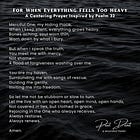There’s something powerful—holy even—about the words “I’m sorry.”
They’re so simple. Just two words. And yet, they carry the weight of repentance, the posture of humility, and the potential for deep healing. These words, when spoken sincerely, can open a doorway to transformation—for relationships, communities, and even churches.
But let’s be honest. Christians—and especially the church as an institution—haven’t always been good at saying them.
Sometimes we’ve avoided apology because we’re afraid it will make us look weak. Sometimes we’ve justified our silence with theological gymnastics. Sometimes we’ve been more committed to protecting reputations than pursuing righteousness. And often, we’ve simply been unwilling to tell the truth about the harm we’ve caused.
But the gospel is not afraid of the truth. In fact, it begins with it.
Jesus himself called people to repent, not because he wanted to shame them, but because he wanted them to be free. The act of confession—of naming our sins and taking responsibility—is not an optional part of discipleship. It is the starting point of healing.
So today, as a pastor, a fellow human being, and a follower of Jesus, I want to say something that should’ve been said more often, and with more sincerity.
I’m sorry.
I’m Sorry for My Part
I’m sorry for the ways I’ve participated in systems that hurt others—through my silence, my ignorance, my defensiveness, or my privilege.
I’m sorry for the moments when I’ve rushed to explain instead of listen, when I’ve centered my comfort instead of someone else’s pain, or when I’ve chosen peace-keeping over truth-telling.
I’m sorry for the ways I’ve benefited from systems that oppress and dehumanize, even when I didn’t mean to. Intent doesn’t erase impact.
I’m sorry for not always being quick to speak up when it mattered, for the times I could have stood in solidarity but chose safety instead.
I’m Sorry for the Church
On behalf of the Christian church, I also say:
We are sorry.
We are sorry for our historical and present-day complicity in White supremacy. For our role in slavery, segregation, and systemic racism. For the ways we have wounded our Black, Indigenous, and communities of color—not just in the past, but right now.
We are sorry for our silence and complicity in the sexual abuse and exploitation of children. For every time a church protected its reputation rather than its most vulnerable members.
We are sorry for the ways we have demeaned and diminished women—denying them leadership, using theology to justify patriarchy, and perpetuating misogyny that harms bodies and souls.
We are sorry for the church’s rejection and vilification of LGBTQIA+ people. For equating identity with immorality. For the harm done in the name of holiness. For every time we failed to see God’s image in someone just because they loved differently.
We are sorry for turning our backs on immigrants and refugees. For building walls instead of longer tables. For choosing nationalism over neighbor-love. For dehumanizing those Jesus called blessed.
We are sorry for the violence committed in the name of Christ—for the ways the church has conquered, colonized, and commodified. For the lands we stole, the cultures we erased, and the spiritual arrogance we baptized.
We are sorry for the exclusion of people with disabilities, for the ways we’ve failed to create accessible, inclusive spaces where everyone is welcomed and valued.
We are sorry for our ableism, ageism, greed, and hypocrisy. For choosing power over people. For using scripture as a weapon. For preaching grace while practicing control.
We are sorry for failing to live the gospel we claim to follow.
Lament. Apologize. Make Amends.
We cannot undo what has been done. But we can name it. We can grieve it. And we can take responsibility.
“Therefore, confess your sins to one another and pray for one another, that you may be healed.” (James 5:16)
Confession isn’t about groveling in shame. It’s about turning toward healing. It’s the path to restoration. And it begins with truth.
We need to normalize the act of apologizing in Christian spaces—not as a PR move, not as damage control, but as discipleship. As the way of Jesus. Because nothing can be made right until we admit what’s wrong.
A Sacred Practice
To the person reading this who’s been hurt by the church—directly or indirectly—I don’t expect these words to fix it. But I do hope they can begin to name the pain and create space for something new.
If you’ve been dismissed, erased, excluded, or harmed, I see you. I believe you. And I’m sorry.
I also want to say to my fellow Christians: let’s not be afraid to own our mistakes. Saying “I’m sorry” doesn’t make us less Christian—it makes us more like Christ. Because the humility to apologize is part of the love that heals.
A Prayer:
God of mercy,
Give us the courage to tell the truth.
Help us stop hiding behind defensiveness or denial.
Make us humble enough to confess.
Make us brave enough to repair.
Teach us to apologize well—without excuses, without evasion.
Let our sorrow bear fruit in justice.
Let our confessions lead to healing.
May we become communities where repentance is welcomed,
and forgiveness flows like a river.
Amen.
Your Turn:
Who do you need to apologize to?
Where is God inviting you to tell the truth?
What would it look like to begin again—not just with words, but with actions?
I’ll be over here, practicing my apologies and praying for grace to make them count.
And if the church has harmed you—again, I’m so sorry. May we never stop becoming the people Jesus calls us to be.









